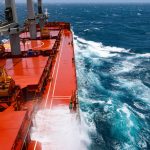As part of a sweeping sanctions package announced on Friday the U.S. State Department targets around one percent of the global LNG fleet. The measures are aimed at sidelining Russia’s LNG sector, including flagship project Arctic LNG 2.
“Attempts to operationalize the Arctic LNG 2 project will continue to be met with a swift US government response, as will other attempts to expand Russia’s energy production and export capacity,” Assistant Secretary Geoffrey R. Pyatt told gCaptain in an emailed statement.
The rate at which the U.S. has announced new sanctions against Russia’s LNG sector has been accelerating. The latest measures come less than three weeks after the country began loading cargo at Arctic LNG 2 using “shadow fleet” vessels.
The new sanctions may also indirectly affect deliveries from thus-far unsanctioned neighboring Yamal LNG. This would constitute a major escalation in the breadth of U.S. sanctions, which hitherto had only targeted future Russian LNG capacity.
“Novatek will do its best not to jeopardize its cash cow, Yamal LNG,” says Mehdy Touil, a lead LNG specialist at Calypso Commodities. But time may be running out for Novatek’s original project.
Last week’s measures include sanctions against seven LNG carriers, including four 2024 newbuilds, North Air, North Mountain, North Sky, and North Way and its operator White Fox Ship Management out of Dubai. One of the vessels, North Sky, loaded liquefied gas at unsanctioned Yamal LNG two weeks ago, with the sanctions effectively “poisoning” its cargo.
North Sky is currently rounding South Korea but its destination remains unknown. Any buyers receiving cargo from the sanctioned vessel will be at risk of secondary sanctions, market analysts told gCaptain.
The sanctions also effectively block the four newbuilds from ever calling at unsanctioned Yamal LNG again, reducing Novatek’s transport capacity. All four vessels hold an Arc4 ice classification, key to transporting LNG once sea ice returns. Their loss further constrains the company’s winter options, especially as other ice-capable carriers remain undeliverable at South Korean shipyard Hanwha due to prior sanctions.
Novatek will likely increasingly have to resort to ship-to-ship transfers to optimize the use of its ice-class vessels and obscure the origin of sanctioned cargos. The first such STS transfer took place over the weekend.
Further comments by Assistant Secretary Pyatt underscore that U.S. sanctions cast a wider net than just Arctic LNG.
“Russia is losing its global energy influence by the day, with few prospects to capture new market share and a determined international response. Working with our G7 and other allies we will keep tightening the screws as we work to ensure Russia can never again leverage its energy resources for political gain,” he said.
Source: gCaptain





